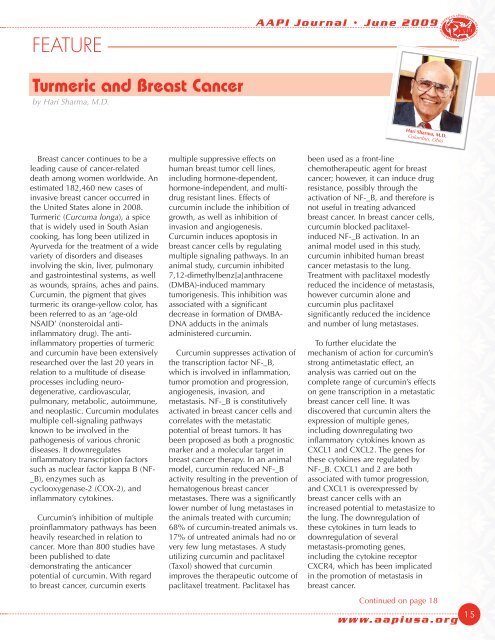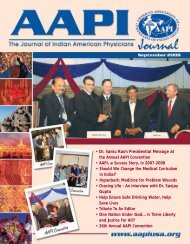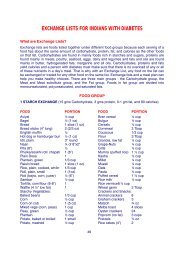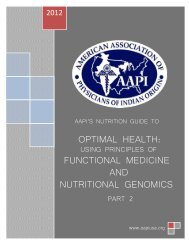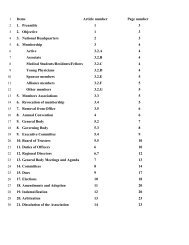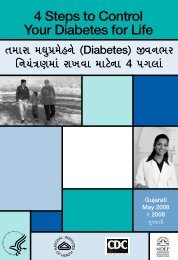Physician Scientist - American Association of Physicians of Indian ...
Physician Scientist - American Association of Physicians of Indian ...
Physician Scientist - American Association of Physicians of Indian ...
Create successful ePaper yourself
Turn your PDF publications into a flip-book with our unique Google optimized e-Paper software.
FEATURE<br />
AAPI Journal • June 2009<br />
Turmeric and Breast Cancer<br />
by Hari Sharma, M.D.<br />
Hari Sharma, M.D.<br />
Columbus, Ohio<br />
Breast cancer continues to be a<br />
leading cause <strong>of</strong> cancer-related<br />
death among women worldwide. An<br />
estimated 182,460 new cases <strong>of</strong><br />
invasive breast cancer occurred in<br />
the United States alone in 2008.<br />
Turmeric (Curcuma longa), a spice<br />
that is widely used in South Asian<br />
cooking, has long been utilized in<br />
Ayurveda for the treatment <strong>of</strong> a wide<br />
variety <strong>of</strong> disorders and diseases<br />
involving the skin, liver, pulmonary<br />
and gastrointestinal systems, as well<br />
as wounds, sprains, aches and pains.<br />
Curcumin, the pigment that gives<br />
turmeric its orange-yellow color, has<br />
been referred to as an ‘age-old<br />
NSAID’ (nonsteroidal antiinflammatory<br />
drug). The antiinflammatory<br />
properties <strong>of</strong> turmeric<br />
and curcumin have been extensively<br />
researched over the last 20 years in<br />
relation to a multitude <strong>of</strong> disease<br />
processes including neurodegenerative,<br />
cardiovascular,<br />
pulmonary, metabolic, autoimmune,<br />
and neoplastic. Curcumin modulates<br />
multiple cell-signaling pathways<br />
known to be involved in the<br />
pathogenesis <strong>of</strong> various chronic<br />
diseases. It downregulates<br />
inflammatory transcription factors<br />
such as nuclear factor kappa B (NF-<br />
_B), enzymes such as<br />
cyclooxygenase-2 (COX-2), and<br />
inflammatory cytokines.<br />
Curcumin’s inhibition <strong>of</strong> multiple<br />
proinflammatory pathways has been<br />
heavily researched in relation to<br />
cancer. More than 800 studies have<br />
been published to date<br />
demonstrating the anticancer<br />
potential <strong>of</strong> curcumin. With regard<br />
to breast cancer, curcumin exerts<br />
multiple suppressive effects on<br />
human breast tumor cell lines,<br />
including hormone-dependent,<br />
hormone-independent, and multidrug<br />
resistant lines. Effects <strong>of</strong><br />
curcumin include the inhibition <strong>of</strong><br />
growth, as well as inhibition <strong>of</strong><br />
invasion and angiogenesis.<br />
Curcumin induces apoptosis in<br />
breast cancer cells by regulating<br />
multiple signaling pathways. In an<br />
animal study, curcumin inhibited<br />
7,12-dimethylbenz[a]anthracene<br />
(DMBA)-induced mammary<br />
tumorigenesis. This inhibition was<br />
associated with a significant<br />
decrease in formation <strong>of</strong> DMBA-<br />
DNA adducts in the animals<br />
administered curcumin.<br />
Curcumin suppresses activation <strong>of</strong><br />
the transcription factor NF-_B,<br />
which is involved in inflammation,<br />
tumor promotion and progression,<br />
angiogenesis, invasion, and<br />
metastasis. NF-_B is constitutively<br />
activated in breast cancer cells and<br />
correlates with the metastatic<br />
potential <strong>of</strong> breast tumors. It has<br />
been proposed as both a prognostic<br />
marker and a molecular target in<br />
breast cancer therapy. In an animal<br />
model, curcumin reduced NF-_B<br />
activity resulting in the prevention <strong>of</strong><br />
hematogenous breast cancer<br />
metastases. There was a significantly<br />
lower number <strong>of</strong> lung metastases in<br />
the animals treated with curcumin;<br />
68% <strong>of</strong> curcumin-treated animals vs.<br />
17% <strong>of</strong> untreated animals had no or<br />
very few lung metastases. A study<br />
utilizing curcumin and paclitaxel<br />
(Taxol) showed that curcumin<br />
improves the therapeutic outcome <strong>of</strong><br />
paclitaxel treatment. Paclitaxel has<br />
been used as a front-line<br />
chemotherapeutic agent for breast<br />
cancer; however, it can induce drug<br />
resistance, possibly through the<br />
activation <strong>of</strong> NF-_B, and therefore is<br />
not useful in treating advanced<br />
breast cancer. In breast cancer cells,<br />
curcumin blocked paclitaxelinduced<br />
NF-_B activation. In an<br />
animal model used in this study,<br />
curcumin inhibited human breast<br />
cancer metastasis to the lung.<br />
Treatment with paclitaxel modestly<br />
reduced the incidence <strong>of</strong> metastasis,<br />
however curcumin alone and<br />
curcumin plus paclitaxel<br />
significantly reduced the incidence<br />
and number <strong>of</strong> lung metastases.<br />
To further elucidate the<br />
mechanism <strong>of</strong> action for curcumin’s<br />
strong antimetastatic effect, an<br />
analysis was carried out on the<br />
complete range <strong>of</strong> curcumin’s effects<br />
on gene transcription in a metastatic<br />
breast cancer cell line. It was<br />
discovered that curcumin alters the<br />
expression <strong>of</strong> multiple genes,<br />
including downregulating two<br />
inflammatory cytokines known as<br />
CXCL1 and CXCL2. The genes for<br />
these cytokines are regulated by<br />
NF-_B. CXCL1 and 2 are both<br />
associated with tumor progression,<br />
and CXCL1 is overexpressed by<br />
breast cancer cells with an<br />
increased potential to metastasize to<br />
the lung. The downregulation <strong>of</strong><br />
these cytokines in turn leads to<br />
downregulation <strong>of</strong> several<br />
metastasis-promoting genes,<br />
including the cytokine receptor<br />
CXCR4, which has been implicated<br />
in the promotion <strong>of</strong> metastasis in<br />
breast cancer.<br />
Continued on page 18<br />
www.aapiusa.org<br />
15


